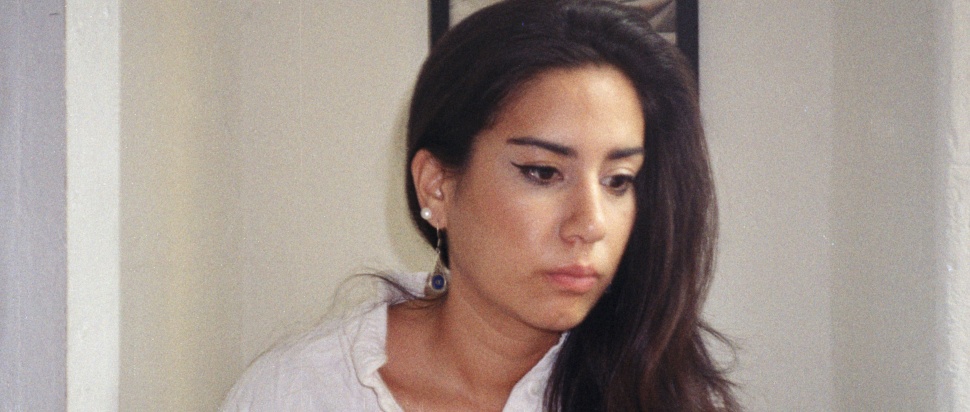Aria Aber on her debut novel Good Girl
We chat with German-Afghan author Aria Aber about her debut novel Good Girl and the complexities of conveying the desires and destructions of the diasporic experience
When I meet Aria Aber over video call the room behind her is sunny and bright, a stark contrast to the already darkened skies outside my window. Splitting her time between California – where she lives – and Vermont – where she teaches – Aber was born in western Germany before spending her early adulthood in Berlin. In many ways, her background mirrors that of her protagonist Nila; a child of Afghan refugees and without papers for much of her childhood. But Nila is not Aria. “I don’t think I understand any of my characters entirely,” she says, “which is good, because then I can let them show me where they want to go.”
Following her acclaimed debut poetry collection Hard Damage, Good Girl is Aber’s first novel. A coming of age story told from Nila’s perspective – nineteen and trapped in the cycle of poverty that refugee and immigrant status brings – Nila is a party girl, chasing excess and running hard from who she is. “I knew that I wanted to write a character like her, who is first of all a wayward Afghan woman, and then someone who can shapeshift and code switch, who can go into different rooms and observe them,” Aria tells me. “I was interested in the innocence but also the slipperiness that youth allows you to inhabit, enact and perform, but that’s also often a little dangerous.”
Nila’s ambiguousness is something she exploits both to her advantage and her deficit; lying often about her background, she paints a picture of a person very different to herself, as anything but Afghan. Her reality is something she is determined to deny and escape, but in doing so she prohibits herself from ever being understood and only traps herself harder. Haunted by her family and their dislocation, her desire for freedom rules, pushing her anywhere but the dilapidated apartment block that is her home.
The strength of Aber’s writing lies in its nuanced exploration of the intersections of racialised class and immigrant experience, embodying the tensions of diasporic culture in vivid tones. Nila’s ‘bad girl’ behaviour – more hedonistic than bad – is mirrored in different women in her community and extended family: girls who run away or rebel, picked up on the border like her cousin, or with deeply entrenched anger, like her mother. The parallels between the men and the women in the familial space she occupies are stark, and segregated.
“I grew up around so many women, not just Afghan, who wanted to be free. And a lot of them end up hurting themselves, or being hurt, because they don’t have the right language or the right tools to manifest that within their community,” Aber explains. In a post-9/11 world, men like Nila’s father, uncles and brothers are forced to police themselves to avoid being perceived as threats or terrorists, and yet within their families and communities the dynamics continue to be patriarchal. They have all the power, and Nila has none. “There seems to be a turning back of the clock,” Aria says. “They come to this new country and are again expected to adhere to gender roles that they weren’t necessarily expected to back in Afghanistan. [That’s] the irony inherent in diaspora communities, or in refugee communities, to preserve the culture that has been lost.”
The reality of this particular refugee experience is the impossibility of return, in contrast to the expats from America, the UK, or the rest of Europe, who are foreigners but not exiles, newcomers but not suspects. “Berlin became international around 2013,” Aber says. “I was trying to write a story that includes the symmetry, or the false symmetry; the parallels between the refugees and the brown immigrants versus the white immigrants who are called expats and have the privilege of always going back to their country of origin.”
Nila’s older, successful love interest is Marlow, an American novelist from whom she seeks cultural capital and a way into exclusive and exclusionary spaces. The Berlin that they move through together, and the architecture that they are both so fascinated by, is a place where the supposedly concluded upheaval of the 20th century is umbilically tethered to that of the global – and particularly Middle Eastern – continually occurring present.
‘Both our families forever entangled with the failed Russian dream, and now we were adrift in a city haunted by that same dream,’ Nila says. As she races through the city, simultaneously fleeing and searching for herself, the landscape of Berlin flashes in its own shapeshifting appearance, revealing and obscuring its complexities. “I wanted to create a consciousness for a character that is similar to my own, where the visual data of place is always analysed and is constantly filtering through the brain,” Aber explains. “That the past is always in the present, and that you can literally touch it.”
Good Girl is out with Bloomsbury on 14 Jan
